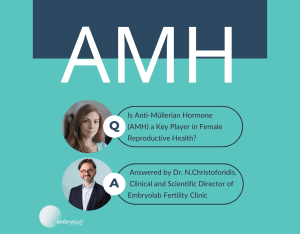
Dr. Nicholas K.Christoforidis, MD, MSc, FRCOG, Consultant Obstetrician & Gynaecologist, Fertility Specialist, Embryolab Clinical & Scientific Director
Anti-Müllerian Hormone (AMH), a glycoprotein produced by specialized cells within ovarian follicles known as granulosa cells, plays a crucial role in female reproduction. It is a hormone essential for the development and maturation of follicles, the specialized structures within which eggs mature for release during ovulation.
Measuring AMH levels in the blood serves as a biological marker for a woman’s ovarian reserve – the number of viable eggs remaining in the ovaries.
As a woman ages, the quantity and quality of her eggs decrease, impacting her fertility. The AMH test is a valuable tool in predicting both natural conception and assisted reproductive technologies (ART), particularly in vitro fertilization (IVF). Clinicians often measure AMH levels to gain a better understanding of a woman’s fertility. Higher AMH values indicate larger ovarian reserves and higher chances of successful IVF.
In the context of IVF, AMH values guide fertility specialists in selecting appropriate stimulation protocols for ovarian stimulation. By assessing a woman’s ovarian response potential, doctors can optimize hormonal treatments, increasing the chances of retrieving multiple viable eggs. This personalized approach is crucial – too little stimulation can lead to low egg yield, while excessive stimulation can cause ovarian hyperstimulation syndrome, with serious side effects for a woman.
Furthermore, AMH’s ability to predict the likelihood of response to fertility treatments and overall reproductive health significantly aids in decision-making regarding family planning and fertility preservation, especially in an era where social trends are delaying attempts to start a family.
In conclusion, Anti-Müllerian Hormone plays a pivotal role in understanding female reproductive health and is indispensable in the field of assisted reproduction. As research continues to advance, AMH is gaining increasing ground in the effort to improve IVF success rates and empower women’s reproductive autonomy.





